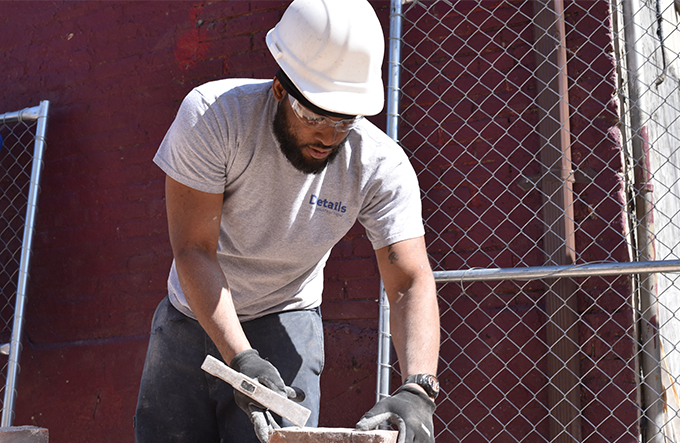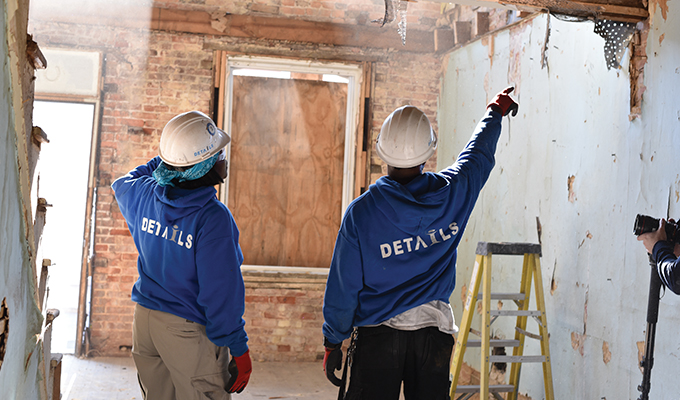ensuring architectural legacy is preserved for reuse
Urban blight is an issue facing many cities across America. Abandoned buildings and substandard housing lead to a host of health conditions and environmental concerns. With almost 16,000 houses in various states of disrepair, Baltimore is no exception. Details Deconstruction is one of the many companies hired by the city to remove blighted properties. But even the most dilapidated buildings can conceal architectural treasures. By focusing on deconstruction rather than demolition, Details is ensuring that the architectural legacy of Baltimore is honored and preserved for reuse. And because it operates as a social enterprise, Details is providing community members an opportunity to gain skills and have a hands-on role in the revitalization effort. Details is proving that a focus on community, and the people in it, can accelerate community revitalization.
HOW DETAILS WAS CREATED
Jeff Carroll has a background in commercial construction, focused primarily on business development and preconstruction project management. Following the 2008 market crash, he began consulting for companies that were looking to do social or environmental good, while remaining economically viable, social enterprises. In 2011, at a social enterprise event he met Cindy Plavier-Truitt, vice president at Humanim, a nonprofit dedicated to helping people who face social or economic challenges achieve economic independence. Over the next several months, the two discussed creating a social enterprise that could be socially impactful, environmentally responsible, and economically feasible. This idea sparked the creation of Details, which launched in 2013. With a mission to provide paid training and job opportunities for workers in Baltimore with limited experience, or facing other systemic barriers to employment, Details began deconstructing private residences along the East Coast. However, as the City of Baltimore began reckoning with a high volume of abandoned buildings, Details saw an opportunity to expand operations. They shuttered their private residence arm and focused on their work with the City of Baltimore removing blighted properties, which is how it operates today.
BUILDINGS ARE DISASSEMBLED
As a deconstruction company, Details doesn’t simply tear down buildings and dispose of the materials in landfills. Rather, they carefully disassemble them, board by board and brick by brick. This is an extremely labor-intensive process and requires a larger staff than traditional demolition teams. In fact, for every one job that demolition creates, deconstruction creates six to eight jobs. That high labor requirement comes at a price. Details processes and recycles any salvageable materials from worksites and sells them to other contractors and builders, bringing in profit that offsets labor costs.
As a green alternative to demolition, deconstruction can divert over 90 percent of building waste from landfills, and in 2014, Details reached a 98 percent diversion rate. The main products coming out of the sites for resale are brick and wood. After being removed from sites, the brick and wood are cleaned and properly processed to be reused in other building projects. Details is able to market the history and legacy of the materials and sell the reclaimed brick and wood as a special commodity. Reselling this material means that there is less need to re-fire new brick or cut down new trees for wood, making deconstruction highly environmentally responsible. Furthermore, Details distributes a large portion of their reclaimed materials locally, cutting down on transportation costs and further lowering the carbon footprint of those materials. The resale of the salvaged material not only keeps the environment greener, but also propels Details to be revenue-positive.
As a social enterprise, Details is also focused on helping the community. With a city-wide unemployment rate of 5.7 percent, with some areas of the city experiencing between 15 and 25 percent unemployment, Baltimore has thousands of people who are looking for work. “As individuals strive to enter the workforce, far too many Baltimore City residents lack access to quality jobs with the required skills to succeed,” says Marci Hunn, program director of jobs at The Harry and Jeanette Weinberg Foundation, an early investor in Details. When Details moved their operations into Baltimore, they realized that the barriers facing workers were more social than anything else. The majority of Details’ workforce are people with criminal backgrounds. Many of these workers cannot find any other work and need this first job to start their careers after being in the prison system. Details works with local organizations that provide re-entry and work training programs to find committed workers who are ready for an opportunity to return to the workforce.
SKILLS AND TRAINING
Deconstruction requires a tremendous amount of skill and training, and Details takes this work seriously. Each trainee is required to perform 640 hours of training in the field. This begins with a 60- to 90-day trial period, in which they learn basic soft-skills and important safety training. Older buildings frequently have toxic materials such as asbestos, lead, and silica that can harm workers. Details ensures all their workers learn how to safely avoid these substances and comply with all OSHA guidelines for construction workers. Workers also get extensive on-the-job training. They start with entry-level tasks like removing nails and work their way up to more complex tasks such as removing joists and processing materials.
GROWTH OPPORTUNITIES
Details also invests in growth opportunities for workers, offering two tracks for advancement. Workers can move into supervisory roles or be trained on light to heavy machinery. These roles require workers who are dedicated and ready to step up to the challenge. However, as a relatively small operation, Mr. Carroll recognizes that not everyone Details hires will work there forever, but he believes that the experience they gain at Details provides them with the stability and skills they need to further their careers. Of the last dozen workers who moved on from Details, three pursued a career in warehousing, while the rest stayed in construction. All but two received pay increases at their new positions.
Details’ success would not be possible without the commitment of outside supporters who believe in this effort. The Baltimore Workforce Funders Collaborative, a public-private partnership dedicated to advancing the labor market prospects of unemployed and underemployed residents of Baltimore, supported Details as they were launching. “Foundation support was critical in keeping the social enterprise going when it was most vulnerable—at its beginning when cash flow was limited,” says Melanie Styles, a program officer at The Abell Foundation, another early investor in Details. Although it was considered a risky bet at the beginning, the model is proving durable.
Details has employed 185 people over its 5 years in operation. “Through the alignment and support of the BWFC, Details was able to provide immediate access to meaningful employment to individuals who previously struggled to work,” says Ms. Hunn. Mr. Carroll sees Details’ success as a first step in exploring new ground in workforce investments. “We hope that we can embolden others to bring workforce development into the social enterprise space.”
Through a nationwide network of more than 30 regions, including the Baltimore Workforce Funders Collaborative, the National Fund for Workforce Solutions helps businesses adopt quality jobs strategies as a competitive advantage. Studies have shown that companies that provide quality jobs to their workers—stable working conditions, decent compensation, and an opportunity to grow and contribute—outperform their competitors. Details has built these practices into the foundation of their organization. All of their employees work full-time and are provided with a generous benefits package that includes health insurance, tuition reimbursement, and employee assistance programs. Through this quality jobs approach, Details provides much-needed economic and social stability to their employees returning from prison. Some have gone on to buy houses, send their kids to college, and start families.
HELPING THE COMMUNITY
As a social enterprise, Details is also focused on helping the community. With a city-wide unemployment rate of 5.7 percent, with some areas of the city experiencing between 15 and 25 percent unemployment, Baltimore has thousands of people who are looking for work. “As individuals strive to enter the workforce, far too many Baltimore City residents lack access to quality jobs with the required skills to succeed,” says Marci Hunn, program director of jobs at The Harry and Jeanette Weinberg Foundation, an early investor in Details. When Details moved their operations into Baltimore, they realized that the barriers facing workers were more social than anything else. The majority of Details’ workforce are people with criminal backgrounds. Many of these workers cannot find any other work and need this first job to start their careers after being in the prison system. Details works with local organizations that provide re-entry and work training programs to find committed workers who are ready for an opportunity to return to the workforce.

AT THE FOREFRONT
Details is at the forefront of rebuilding whole communities from the ground up. By deliberately hiring in the neighborhoods in which they work, Details creates opportunities in areas ravaged by deindustrialization. This helps lower the unemployment rate, while simultaneously building the local economy. In fact, Details is partnering with a local recycling company that helps process the materials from their sites. The increased business from Details creates more jobs in the local economy.
Details currently has about 30 full-time employees and are on pace to deconstruct between 200 and 250 buildings this year. Since their founding, Details has deconstructed over 650 buildings, and employed 185 people, providing new opportunity for neighborhoods and the people who live in them.
CLOSING THOUGHT
After 5 years, Details has proven to be the socially impactful, environmentally responsible, and economically feasible organization they set out to be. “The success of Details highlights how public dollars can be directed towards employing the hardest to serve and addressing a major issue in Baltimore, how foundation dollars can leverage that public commitment, and how a nonprofit can create a viable social enterprise,” says Melanie Styles, a program officer at The Abell Foundation. “It really is a good story.”
for more information:
Article from the National Fund for Workforce Solutions. For more information about the work Details Deconstruction is doing in Baltimore and how you can make a difference in your own community, visit details.org.
Modern Contractor Solutions, September 2019
Did you enjoy this article?
Subscribe to the FREE Digital Edition of Modern Contractor Solutions magazine.



